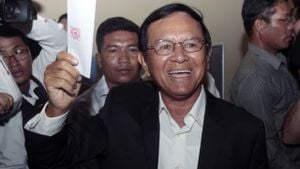After more than fourteen months of nearly uninterrupted conflict, Israel and Hezbollah finally reached a ceasefire, one of the most significant developments to ease years of intense hostilities between these parties. The announcement, aimed at halting the violence and providing respite for suffering civilians, coincides with significant geopolitical maneuvers from key world leaders.
Israel's anticipated approval of this ceasefire aligns with the U.S. initiative for regional harmony, marking the end of another bloody chapter sparked by the Israel-Hamas war which began on October 7, 2023. An Israeli official shared insights on the promising framework for peace on Tuesday, indicating optimism from both the Israeli and Lebanese fronts. "We are close," U.S. National Security spokesperson John Kirby remarked, underscoring the delicate nature of these discussions.
Facilitated through tense negotiations involving the U.S. and France, the ceasefire terms require Israeli forces to withdraw southward, allowing Lebanon's army to occupy the region—particularly the southern territories long dominated by Hezbollah—within the next two months. "Both sides are tired," stated Selim Ayoub, speaking for many weary civilians caught up in the relentless violence.
Preceding this ceasefire, attacks escalated dramatically, with Israel conducting airstrikes on Hezbollah-controlled areas and Hezbollah raining rockets across the border, including some targeting the outskirts of Tel Aviv. A civilian from the Israeli town of Shomera recounted the harrowing experience of near-constant threats, saying, "The missiles are chasing us all the time."
This latest escalation has claimed thousands of lives—over 3,500 reported dead in Lebanon alone—while many more have been displaced, leaving homes and communities shattered. Families have begun to cautiously return to their homes post-ceasefire, facing the reality of devastation across southern Lebanon. Roads jammed with returning residents reflect both relief and the palpable fear of future conflict, emphasizing the fragile state of peace.
Beyond civilian losses, Hezbollah's leadership has also been heavily impacted, with Israel managing to eliminate high-ranking officials within the group, including their leader Hasan Nasrallah. These developments suggest the Israeli Defense Forces (IDF) achieved substantial military objectives, allegedly diminishing Hezbollah’s operational capacity significantly. Yet, even under these pressures, Hezbollah maintained its ability to launch considerable rocket barrages toward Israeli targets, indicating the group has not been entirely incapacitated.
The ceasefire, crafted through complex international diplomacy, aims to bring stability by invoking UN Security Council Resolution 1701, previously employed to mediate peace after the 2006 Lebanon war. High hopes are set on the groundwork being laid for sustained peace, albeit the legacy of past agreements casts shadows on the road ahead. Critically, any lasting peace will rely heavily on effective enforcement and the good faith of both parties to uphold the terms agreed upon.
Yet, skepticism remains on the durability of this truce. Senior military officials from both Israel and Lebanon have signaled the necessity of maintaining the right to revert to military action should ceasefire violations erupt. Israeli ambassador Danny Danon reiterated, "Israel must retain its ability to strike if our security is threatened."
Lebanon's current political climate is laden with challenges. The country’s economy is on the brink of collapse, with inflation rates skyrocketing and many citizens struggling to meet basic needs. The unfortunate reality of reconstruction looms, as thousands of Lebanese face unlivable conditions, many returning to simply rubble. The historical grievances between Lebanon and Israel add to the complexity of reconciliation efforts, with each side holding tight to their narratives of victimhood.
Yet, this ceasefire brings with it the smallest glimmer of hope for Lebanon. Political leaders, including Lebanese Foreign Minister Abdallah Bou Habib, have voiced optimism about the ceasefire leading to broader diplomatic engagement and discussions, potentially paving pathways for economic recovery and stability. "There are no serious obstacles left to start implementing it—unless Netanyahu changes his mind," Bou Habib ventured at the G7 meeting.
Critically, this ceasefire also takes place against the backdrop of wider regional transformations. Israeli Prime Minister Benjamin Netanyahu announced this ceasefire could, paradoxically, facilitate his broader military objectives—dismantling Hamas completely. The strategy evidently intertwines the Lebanese front with aspirations of weakening Iranian influence across the Middle East.
Another aspect sharpening the political dynamics is the re-election of Donald Trump, the incoming U.S. President, who has also maintained ties with Saudi Arabia. Initial conversations hint at shifting regional strategies—Trump’s administration may aim to leverage the peace between Israel and Hezbollah to address the Iranian threat more directly.
During this transition, key leaders from other significant nations are contemplating their next moves, with many keeping tabs on how the ceasefire might reshape alliances and regional policies. A new plan for Gaza proposed by Egypt also introduces the notion of establishing control over humanitarian aid and explosive cessation, creating yet another layer of complexity.
Despite the hope emanated by the ceasefire, the past is replete with disappointments. The historic failures of the 2006 arrangement suggest caution; there’s skepticism over whether both parties can prioritize lasting peace over nationalistic fervor or military pride. Many locals express doubt over whether sustainable peace is feasible, as some still recount the traumas of past conflicts.
Israel's insistence on maintaining military capabilities related to any future threats starkly contrasts Lebanon's desires for sovereignty and independence from external aggression. Hezbollah's recent strategic orientations may enable it to continue leveraging its armed status, creating probable scenarios where future hostilities might undermine such fragile truces.
Another key element shaping the upcoming chapters is what survives of the international community's interest. The attention drawn from U.S. officials and other world leaders and their commitment to observing ceasefire compliance play pivotal roles. True stability cannot solely be driven by the agreements made on paper but requires financial and political commitments from powerful allies.
While many Lebanese return to find their homes damaged, the glimpse of progress may inspire groups and factions within Lebanon to seek reconciliation rather than conflict. Education campaigns focusing on peace and recovery could emerge as equally important undertakings through governmental and NGO efforts, fostering dialogue among divided communities.
On the Israeli side, significant adjustments may also be needed as communities affected grapple with their own traumas and fear of retaliatory violence. Reconciliation takes two, and patience will be required as they move toward rebuilding trust.
Conclusively, the ceasefire can be seen more as the start of another delicate phase rather than simply the end of fighting. Recovery and peace-building efforts are not achieved through decrees but demand genuine efforts from all stakeholders involved. Only the future will reveal whether the fragile hopes for peace can outlast the deep-seated animosities and historical grievances haunting both sides.



